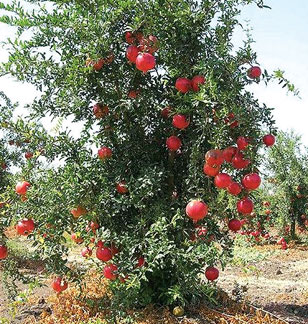|
Pomegranate :
The ruby jewel fruit
by Shari Jayawardhana
The pomegranate fruit is well known for its exquisite beauty,
flavour, colour, and health benefits for centuries. From their
distinctive crown to their ruby red arils, pomegranates are royalty
among fruits. They are symbolic of prosperity and abundance in virtually
every civilisation.
 The name "pomegranate" derives from the French term pomme granate
meaning 'seeded apple.' It is also sometimes referred to as a Chinese
apple. Many scholars believe that the forbidden - yet irresistible -
fruit in which Eve indulged within the Garden of Eden was actually a
pomegranate (and not an apple). The name "pomegranate" derives from the French term pomme granate
meaning 'seeded apple.' It is also sometimes referred to as a Chinese
apple. Many scholars believe that the forbidden - yet irresistible -
fruit in which Eve indulged within the Garden of Eden was actually a
pomegranate (and not an apple).
The Pomegranate or Punica granatum L. belongs to the Punicaceae
family. It is between a lemon and a grape fruit in size. It ranges from
about 5-12cm in diametre and is the shape of a rounded hexagon.
Water-laden pulp
The seeds of the Pomegranate fruit vary from 200-1,400 and they are
deep red in colour. Each seed has a surrounding water-laden pulp. The
pomegranate tree grows to about 5-8 metres tall. It is cultivated
commercially across the Indian sub-continent, Iran, Caucuses and
Mediterranean regions. In Sri Lanka, the fruit, is known as Delum in
Sinhala and Mathulai in Tamil. Sri Lankans cultivate it in their home
gardens as a medicinal plant or a fruit tree.
The fresh fruits of pomegranate are generally eaten raw. In countries
such as Sri Lanka, the pomegranate juice is a very popular beverage. The
extracted juice may be concentrated and frozen for future use.
It may also be made into thick syrup for use as a sauce and is also
often converted into wine. Pomegranate seeds, dried with the pulp are
commonly used as a spice in many dishes. The seeds are also used as a
garnish on rice dishes, waffles, pancakes and ice cream sundaes. This
ruby-red fruit is a rich source of soluble and insoluble dietary fibres
which aid in digestive and bowel movements. A regular intake of
pomegranate is suggested by nutritionists in weight reduction and
cholesterol controlling programs. Regular inclusion of pomegranate in
the diets boosts immunity, improves circulation, and offers protection
from cancers.
Pomegranate juice is a good source of vitamins C and B.The
pomegranate fruit is rich in beneficial antioxidants, like polyphenols,
tannins and anthocyanins. The antioxidant level in pomegranate juice is
higher than in other fruit juices, red wine or green tea. Recent
research has shown that pomegranates can help fight osteoarthritis, as
regular consumption of the juice slows down the deterioration of the
cartilage. The juice of the fruit also has antiviral and antibacterial
effects against dental plaque. Consumption of pomegranate juice has
proven to help immensely in cases of prostate cancer or prostatic
hyperplasia, diabetes or lymphoma. The Pomegranate has polyphenols, a
type of antioxidant that aids in extending the life span and slows the
process of ageing.
It increases blood flow to the heart, and is extremely beneficial for
people with ischemic heart disease as it contains vitamins and enzymes
known for keeping low-density lipoprotein (LDL) or "bad" cholesterol
from oxidising and causing atherosclerosis, or hardening of the
arteries. The organic pomegranate seeds act a lot like aspirin, keeping
blood platelets from sticking together and forming dangerous blood
clots.
Traditional remedy
The delum fruit is used in Sri Lankan native treatment. The rind of
the fruit and the bark of the pomegranate tree is used as a traditional
remedy against diarrhoea, dysentery and intestinal parasites. The seeds
and juice are considered a tonic for the heart and throat. The
astringent qualities of the flower, juice, rind and tree bark are
considered valuable for a variety of purposes, such as stopping nose
bleeds and gum bleeds, toning skin, (after blending with mustard oil)
and treating haemorrhoids. Pomegranate juice (of specific fruit strains)
is also used as eye drops as it is believed to slow the development of
cataract.
Long thought to be a luxurious and healthy fruit for the skin, it's
recently shown in studies to actually help encourage cell regeneration,
aiding in daily skin repair and helping to reduce the signs of ageing.
The pomegranate fruit which is rich in antioxidants has been used in
ayurvedic skin care for centuries. The fatty acids found in the fruit
promotes the regeneration of the epidermis, improves the elasticity of
the skin and provides intense nourishment for dry skin and enhancing it
with a healthy and radiant glow.
Pomegranate can be used to produce different value added products
such as jam, cordials, ice-cream, flavoured tea, energy drinks and a
host of skin care products. These value added products can be produced
in by either cottage level or large scale level. In addition to that
research and development activities in Sri Lanka should focus on
identifying the maturity index for different types of pomegranate,
storage methods, environmental and consumer friendly ripening methods,
development of value added products with enhanced shelf life and
preserve nutritional quality. |

